#matric year
Text

I've had my last athletics/sports day ever yesterday...it's lowkey kind of painful, the nostalgia's hitting hard guys
Good luck to all the other 12th graders out there for your studies and emotional moments 🥹
#studyblr#study motivation#studyspo#study hard#study blog#student#studying#adhd studyblr#study inspiration#productivity#last days of high school#senior year#senior high school#high school#high school senior#matric#matric year#12th grade#learnelle#heytess#heypeachblossom
15 notes
·
View notes
Text
got a snapchat memory of a quote from my year 12 maths textbook
if you wish to forget that you have broken the law, answer me these matrices four
#i just spent 40 minutes trying to find the full quote#it was this whole scene of these two characters exploring these caves and it was this full story#like this textbook author needs to shift what genre they're writing because it was intriguing af#bingofoxe told me i should post it so here you go#mads makes a post#math#how do i tag this#this feels inappropriate for a math tag but its maths!!! its matrices!!#its been two years i don't think i could do matrices if you held a gun to my head
20 notes
·
View notes
Text
what are your opinions on linear algebra. personally it’s my least favorite math style
fuck linear algebra
i just failed a linear algebra midterm
#3rd year college student i’m so done with math courses#like omg aspects of it are so useful in physics (my major) lik#like matrices and transformations#but FUCKKKIJFFFNG SHIT I HATE THE ABSTRACT SHIT#fuck abstract vector spaces fuck abstract vector spaces fuck#i don’t even remember what was on my midterm and i sure as hell didn’t know what it was when i was actually looking at it#basis of a null space FUCK YOU!!!!!!!!!!
2 notes
·
View notes
Text
i am 99% convinced the private school i spent the remainder of my high school years in only used to government system to boost their pass rates and average marks for advertising purposes bc god on earth it was not because it had any kind of academic integrity
#it's like...in an entire year in english we would do ONE book and ONE play and ONE poem and maybe a short story?#like i could condense all i learnt into the space of a year WITH us still getting a slightly more tailored education bc...private#(the gov system has been tailored so that as many people can pass matric as possible regardless of how much they've actually learnt)#diary#sorry i've been out of school for eight years now but i still have to fume at how fucking useless it all was#and i went to GOOD schools!#(supposedly good schools#if you ever hear of someone burning down a nationally recognized girls school ont he east coast it was me and i was doing society a favour)
2 notes
·
View notes
Text
my maths skills are like trying to fill a sieve with water - the second I stopped adding to them they drained
#3 years ago I was solving differential equations without calculators and doing maths with matrices#now I have to think before remembering how to calculate percentages 😂#maddie debrief
0 notes
Text
BSE Odisha Matric Result: विधायक अंगदा कन्हर ने 44 साल बाद की 10वीं की परीक्षा पास, हो रही है तारीफ
BSE Odisha Matric Result: विधायक अंगदा कन्हर ने 44 साल बाद की 10वीं की परीक्षा पास, हो रही है तारीफ
ओडिशा के विधायक अंगदा कन्हर (Angada Kanhar) ने 58 साल की उम्र में बीएसई ओडिशा मैट्रिक की परीक्षा पास कर सभी को चौंका दिया है। ओडिशा के विधायक प्रथम श्रेणी में पास हुए हैं। बता दें, माध्यमिक शिक्षा बोर्ड ओडिशा या बीएसई ओडिशा ने 6 जुलाई, 2022 को 5 लाख से अधिक उम्मीदवारों के लिए 10वीं का परिणाम घोषित किया था।
इन 5 लाख उम्मीदवारों में BJD फूलबनी विधायक अंगदा कन्हार भी शामिल थे। ओडिशा के विधायक ने…
View On WordPress
#58 year old#58 वर्ष#BSE Odisha Matric Result 2022#education#Hindi News#Hindustan#MLA education#News in Hindi#Odisha MLA Angada Kanhar#ओडिशा विधायक अंगदा कन्हार#बीएसई ओडिशा मैट्रिक परिणाम 2022#विधायक शिक्षा#शिक्षा#हिन्दुस्तान
0 notes
Text
1968 [Chapter 5: Artemis, Goddess Of The Hunt]

Series Summary: Aemond is embroiled in a fierce battle to secure the Democratic Party nomination and defeat his archnemesis, Richard Nixon, in the presidential election. You are his wife of two years and wholeheartedly indoctrinated into the Targaryen political dynasty. But you have an archnemesis of your own: Aemond’s chronically delinquent brother Aegon.
Series Warnings: Language, sexual content (18+ readers only), violence, bodily injury, character deaths, New Jersey, age-gap relationships, drinking, smoking, drugs, pregnancy and childbirth, kids with weird Greek names, historical topics including war and discrimination, math.
Word Count: 6.6k
Let me know if you'd like to be tagged! 🥰
💜 All of my writing can be found HERE! 💜
“So you smoked grass in college,” Aegon says, pondering you with glazed eyes as he slurps his cherry-flavored Mr. Misty. You’re in Biloxi, Mississippi where Aemond is making speeches and meeting with locals to commemorate the first summer of the beaches being desegregated after a decade of peaceful protests and violent white supremacist backlash. Route 90 runs right along the sand dunes. If you walked out of this Dairy Queen, you could look south and see the Gulf of Mexico, placid dark ripples gleaming with moonshine. “And swore, and had a boyfriend, and presumably, what, did shots? Skipped class on occasion?”
“Yeah,” you admit, smiling sheepishly, remembering. You stretch out your fingers. “I chewed gum, I talked during mass. And I loved black nail polish. The nuns would beat my knuckles with rulers, I always had bruises. I wore these flowing skirts down to my ankles and knee-high boots. My hair was a mess, long and blowing around everywhere. My friends and I would do each other’s makeup, silver glitter and purple shadow, pencil on a ridiculous amount of eyeliner and then smudge it out. If you saw a photo you wouldn’t recognize me.”
Aegon takes a drag on his Lucky Strike cigarette, weightless smoke and the tired yellowish haze of florescent lights. Buffalo Springfield’s For What It’s Worth is playing from the Zenith radio on the counter by the cash register. “I’d recognize you.”
“I used to skip this one class all the time. The professor was a demon. I could do the math, but not the way he wanted me to. Right solution, wrong steps, I don’t know. I learned it differently in high school, and I couldn’t figure out the formula he wanted me to use. So he’d mark everything a zero even if my answer was correct. I couldn’t stand that bastard. Then the nuns kept catching me sunbathing on the quad when I was supposed to be in Matrices and Vector Spaces. I racked up so many demerits they were going to revoke my weekend pass, and then I wouldn’t be able to go into the city with my friends. So I stole the demerit book and burned it up on the stove in my dorm. Almost set the whole building on fire.”
Aegon is laughing. “You did not. Not you, not perfect ever-obedient Miss America!”
“I did. I really did.” You sip your own Mr. Misty, lemon-lime. Across the restaurant, Criston and Fosco are eating banana splits—dripping chocolate syrup and melted ice cream all over their table—and passionately debating who is going to end up in the World Series; Criston favors the Cardinals and the Orioles, Fosco says the Red Sox and the Cubs. The rest of the Targaryen family is back at the hotel watching news coverage of the Republican National Convention, something you can only stomach so much of, Otto’s cynical commentary, Aemond’s remaining eye fixed fiercely on the screen as he nips at an Old Fashioned. “I was wild back then.”
“And you gave it all up to be Aemond’s first lady.”
You think back to where it started: palm trees, salt water, alligators in drainage ditches. “My father grew up in a shack outside of Tallahassee. No electricity, no running water, he dropped out of school in eighth grade to help take care of his siblings when his mom died. They moved south to live with their aunt in Tampa, and my father wound up in Tarpon Springs working as a sea sponge diver.”
Aegon’s eyebrows rise, like he thinks you’re teasing him. “Sea sponges…?”
“I’m serious! It paid better than picking oranges or sweeping up in a factory. It’s dangerous. You have to wear this heavy rubber suit and walk around on the ocean floor, sometimes 50 feet or more below the surface.”
“What do people do with sea sponges?”
“Oh right, you would be unfamiliar. You’re supposed to clean yourself with them, like a loofah. Soap? Water? Ringing any bells?”
He chuckles and rolls his eyes. “You’re a very mean person. Aren’t you supposed to be setting an example for the merciful wives and daughters of this great nation?”
“Painters and potters buy sponges too. And some women use them as contraceptives. You can soak them in lemon juice and then shove them up there and it kills sperm.”
“I suddenly have great appreciation for the sea sponge industry. God bless the sea sponges.”
“So my father spent a few years diving, and he fell in love with a girl who worked at one of the shops he sold sponges to. That was my mother. They got married when he had absolutely nothing, and by their fifth anniversary he had his own fleet of boats, a gift shop, and a processing and shipping facility, all of which they owned jointly. They just opened the Spongeorama Sponge Factory this past April, a cute little tourist trap. But my point is that they were partners from the start. My father listens to my mother, and she works alongside him, and it was never like what I’ve seen from my friends’ parents: dad at the office 80 hours a week, mom at home strung out on Valium, just these…deeply separate, cold planets locked in orbit but never touching each other. I knew I didn’t want that. I wanted a husband who was building something I could be a part of. I wanted a man who respected me.”
Aegon watches you as he lights a fresh cigarette, not saying what you imagine he wants to: And how is that working out? He puffs on his Lucky Strike a few times and then offers it to you. You aren’t supposed to smoke, not even tobacco—it’s not ladylike, it’s masculine, it’s subversive—but you take it and hold it between your index and middle fingers, inhaling an ashy bitterness that blood learns to crave. The bracelets on your wrist jangle, thin silver chains that match the diamonds in your ears. Your dress is mint green, your hair in your signature Brigitte Bardot-inspired updo. Aegon is wearing a black t-shirt with The Who stamped across the front. When you pass the cigarette back to him, Aegon asks: “What music did you listen to? The Stones, The Animals?”
“Yeah. And Hendrix, The Kinks, Aretha Franklin…”
“Phil Ochs?”
“I love him. He’s got a song about Mississippi, you know.”
“Oh, I’m aware. It’s one of my favorites.”
“And I’m currently getting a little obsessed with Loretta Lynn. She’s so angry!”
“She’s sanctimonious, that’s what she is. Always bitching about men.”
“Six kids and an alcoholic husband will do that to someone.”
Aegon winces, and then you realize what you’ve said. Loretta Lynn sounds a lot like Mimi. He finishes his Mr. Misty and then fidgets restlessly with his white cardboard cup, spinning it around by the straw. You feel bad, though you shouldn’t. You wouldn’t have a month ago.
“Aegon,” you say gently, and he reluctantly looks up at you, sunburned cheeks, blonde hair shagging over his eyes. “Why do you ignore your children? They’re interesting, they’re fun. Violeta invited me to help her make cakes with her Easy-Bake Oven last week. And Cosmo…he’s so clever. But it’s like he doesn’t know who you are. He might actually think Fosco’s his dad.”
Aegon takes one last drag off his cigarette and discards the end of it in his Mr. Misty cup. Now he’s fiddling with it again, avoiding your gaze. “I don’t have much to offer them.”
“I think you do.”
“No you don’t.”
“I do,” you insist. “You can be kind of nice sometimes.”
He frowns, staring out the window. You know he can’t see anything but darkness and streetlights. “I should have been the one to go to Vietnam. If somebody had to get shot at so Aemond could be president, I was the right choice. No one would miss me. No one would mourn me. Daeron didn’t deserve that. But I was too old, so Otto and my father got him to enlist. Now he’s in the jungle and my mother has nightmares about Western Union telegrams. If I was the son over there, I think she’d sleep easier.”
I’m glad you’re still here, you think. Instead you say: “Your children need you.”
“No they don’t. Between me and Mimi, they’re better off as orphans. Helaena and Fosco can be their parents. Maybe they’ll have a fighting chance.”
The glass door opens, and a man walks into the Dairy Queen with his two sons scampering behind him, all with sandy flip flops and carrying fishing rods. The dad is at least six feet tall and brawny, and wearing a Wallace For President baseball cap. You and Aegon both notice it, then share an amused, disparaging glance. You mouth: Imbecile bigot. The man continues to the cash register and orders two chocolate shakes and a root beer float. At their own table, Criston is mopping up melted ice cream with napkins and telling Fosco to stop being such a pig.
“Me?!” Fosco says. “You are the pig, that spot there is your ice cream, do not blame your failings on poor Fosco. I have already let you drag me to this terrible state and never once complained about the fried food or the mosquitos. And that thing out there is not a real beach. The water is still and brown, brown!”
“For once in your life, pretend you have a work ethic and help me clean up the table.”
“You are being very anti-immigrant right now, do you know that?”
Aegon begins singing, ostensibly to himself. “Here’s to the state of Mississippi, for underneath her borders, the devil draws no lines.”
“Aegon, no,” you whisper, petrified. You know this song. You know where he’s going.
He’s beaming as he continues: “If you drag her muddy rivers, nameless bodies you will find.”
Now the man in the Wallace hat is looking at Aegon. His sons are happily gulping down their chocolate shakes. Criston and Fosco, still bickering, haven’t noticed yet.
“Oh, the fat trees of the forest have hid a thousand crimes.”
“Aegon, don’t,” you plead quietly. “He’ll murder you.”
“The calendar is lyin’ when it reads the present time.”
“Hey,” calls the man in the Wallace For President hat. “You got a problem, boy?”
Aegon drums his palms on the tabletop as he sings, loudly now: “Oh, here’s to the land you’ve torn out the heart of, Mississippi find yourself another country to be part of!”
In seconds, the man has crossed the room, grabbed Aegon by the collar of his t-shirt, yanked him out of his chair and struck him across the face: closed fist, lethal intent, the sick wet sound of bones on flesh. Aegon’s nose gushes, his lip splits open, but he isn’t flinching away, he isn’t afraid. He’s yowling like a rabid animal and clawing, kicking, swinging at the giant who’s ensnared him. You are screaming as you leap to your feet, your chair falling over and clattering on the floor behind you. The man’s sons are hooting joyously. “Git him, Paw!” one of them shouts.
“Criston?!” you shriek, but he and Fosco are already here, tugging at the man’s massive arms and beating on his back, trying to untangle him from Aegon.
“Stop!” Criston roars. “You don’t want to hurt him! He’s a Targaryen!”
“A Targaryen, huh?” the man says as he steps away, wiping the blood from his knuckles on his tattered white t-shirt, stained with fish guts. “All the better. I wish that bullet they put in Aemond woulda been just another inch to the left. Directly through the aorta.”
Aegon lunges at the man again, hissing, fists swinging. Fosco yanks him back.
“Are you gonna call someone or not?!” Criston snaps at the girl behind the cash register, but she only gives him a steely glare in return. This is Wallace country. There’s a reason why it took four years after the Civil Rights Act of 1964 to finally desegregate the beaches.
“We should go,” you tell Criston softly.
“Yes, we will leave now,” Fosco says, hauling Aegon towards the front door. Then, to the cashier: “Thank you for the ice cream, but it was not very good. If you are ever in Italy, try the gelato. You will learn so much.”
“I can’t wait ‘til November,” the man gloats, ominous, threatening. His sons are standing tall and proud beside him. “When Aemond loses, you can all cart your asses back to Europe. We don’t want you here. America ain’t for people like you.”
“It literally is,” you say, unable to stop yourself. “It’s on the Statue of Liberty.”
“Yeah, where do you think your ancestors came from?!” Aegon yells at the man. “Are you a Seminole, pal? I didn’t think so—!” Fosco and Criston lug him through the doorway before more punches can be thrown.
Outside—under stars and streetlights and a full moon—Aegon burst out laughing. This is when he feels alive; this is when the blood in his veins turns to wave and riptides. You didn’t think to grab napkins from the table, so you wipe the blood off his face with your bare hand, assessing the damage. He’ll be fine; swollen and sore, but fine.
“You’re insane, you know that?” you say. “You could have been killed.”
Aegon pats your cheek twice and grins, blood on his teeth. “The world would keep spinning, little Io.” Then he starts walking back towards the White House Hotel.
~~~~~~~~~~
When the four of you arrive at your suite, Aemond, Otto, Ludwika, and Alicent are still gathered around the television. The nannies have taken the children to bed. Helaena is reading The Bell Jar in an armchair in the corner of the room. Mimi is passed out on the couch, several empty glasses on the coffee table. ABC is showing a clip they recorded earlier today of Ludwika travelling with Aemond’s retinue after he made an impassioned speech condemning the lack of recognition of the evils of slavery at Beauvoir, the historic home of former Confederate president Jefferson Davis. The reporter is asking Ludwika what she thinks makes Aemond a better presidential candidate than Eugene McCarthy, as McCarthy shares many of the same policy positions and has an additional 15 years of political experience.
“This McCarthy is not a real man,” Ludwika responds, her face stony and mistrustful. “He reminds me of the communists back in my country. Did you know he met with Che Guevara in New York City a few years ago? Why would he do such a thing?”
Now, Otto turns to her in this hotel room. “I love you.”
Ludwika takes a sip of her martini. “I want another Gucci bag.”
“Yes, yes. Tomorrow, my dear.”
“What happened to you?” Aemond asks his brother, half-exasperated and half-concerned. Criston has fetched a washcloth from the bathroom for Aegon to hold against his bleeding lip and nose. Aemond is still wearing his blue suit from a long day of campaigning, but he’s taken out his eye and put on his eyepatch. His gaze flicks from Aegon’s face to the blood still coating your left hand. On the couch, Mimi’s bare foot twitches but she doesn’t wake up.
“There was a Wallace supporter at the Dairy Queen,” you say. “Aegon felt inspired to defending you.”
Aemond chuckles. “Did you win?” he asks Aegon.
“I would have if the guy wasn’t two of me.”
On the television screen, Richard Nixon is accepting his party’s nomination for president at the Republican National Convention in Miami, Florida.
“He’s a buffoon,” Otto sneers. “So awkward and undignified. Look at him sweating! Look at those ridiculous jowls! And he comes from nothing. His family is trash.”
“Americans love a rags to riches story,” you say. And then, somewhat randomly: “He loves his wife. He proposed to Pat on their very first date, and she said no. So he drove her to dates with other men for years until she finally reconsidered. He said it was love at first sight. He’s never had a mistress. And jowls or no jowls, his family adores him.”
Aegon turns to you, still clutching the washcloth against his face. “Really?”
You nod. “That’s the sort of thing the women talk about.”
There’s a knock at the door. You all look at each other, confounded; no one has ordered room service, no one is expecting any visitors, and the nannies have keys in the event of an emergency. Fosco is closest to the door, so he opens it. A man in uniform is standing there with a golden Western Union telegram in his hands. Alicent screams and collapses. Criston bolts to her.
“It’s okay,” you say. “He’s not dead. Whatever happened, Daeron’s not dead.”
Otto crinkles his brow at you. “How do you know?”
“Because if he was killed, there would be a priest here too.” They always send a priest when the boy is dead. Aegon glances at you, eyes wet and fearful.
“Ma’am,” the soldier—a major you see now, spotting the golden oak leaves—says to Alicent as he removes his cap. “I regret to inform you that your son Daeron was missing in action for several weeks, and we’ve just received confirmation that he’s being held as a prisoner of war in Hỏa Lò Prison.”
“He’s in the Hanoi Hilton?!” Otto exclaims. “Oh, fuck those people and their swamp, how did Kennedy ever think we had something to gain from getting tangled up in that mess?”
“But he’s alive?” Aemond says. “He’s unharmed?”
“Yes sir,” the captain replies. “It is our understanding that he is in good condition. The North Vietnamese are aware that he is a very valuable prisoner, like Admiral McCain’s son John. He’ll be used in negotiations. He is of far more use to them alive than dead.”
“So we can get Daeron back,” Aegon says. “I mean, we have to be able to, right? Aemond’s running for president, he’ll probably win in November, we have millions of dollars, we can spring one man out of some third-world jail, right?”
The captain continues: “Tomorrow when your family returns to New Jersey, the Joint Chiefs of Staff will be there to discuss next steps with you. I’m afraid I’m only authorized to give you the news as it was relayed to me.” He entrusts the telegram to Otto, who rapidly opens it and stares down at the mechanical typewriter words.
“I have to pray,” Alicent says suddenly. “Helaena, will you pray with me? There’s a Greek church down the road. Holy Trinity, I think it’s called.”
Obediently, Helaena joins her mother and follows her to the doorway. Criston leaves with them. Otto gives his new wife a harsh, meaningful stare. Ludwika, an ardent yet covert atheist, sighs irritably. “Wait. I want to pray too,” she says, and vanishes with them into the hall.
As the captain departs, Mimi sits up on the couch, blinking, groggy. “What? What happened?”
“Go with Alicent,” Otto tells her. “She’s headed downstairs.”
“What? Why…?”
“Just go!” he barks.
Mimi staggers to her feet and hobbles out of the hotel room, her sundress—patterned with forget-me-nots—billowing around her. The only people left are Otto, Aemond, Fosco, Aegon, and you. The fact that you are the sole woman permitted to remain here feels intentional.
After a moment, Otto speaks. “You know, John McCain has famously refused to be released from the Hanoi Hilton until all the men imprisoned before him have been freed. He doesn’t want special treatment. And that’s a very noble thing to do, don’t you think? It has endeared him and the McCains to the public.”
Aemond and Otto are looking at each other, communicating in a silent language not of letters or accents but colors: red ambition, green hunger, grey impassionate morality. Fosco is observing them uneasily. Aemond says at last: “Daeron wants to help this family.”
“You’re not going to try to get him out.” Aegon realizes.
Aemond turns to him, businesslike, vague distant sympathy. “It’s only until November.”
“No, you know people!” Aegon explodes. “You pick up the phone, you call in every favor, you get him out of there now! You have no idea if he has another three months, you don’t know what kind of shape he’s in! They could be dislocating his arms or chopping off his fingers right now, they could be starving him, they could be beating him, you can’t just leave him there!”
“It’s not your decision. It could have been, had you accepted your role as the eldest son. But you didn’t. So it’s my job to handle these things. You don’t get to hate me for making choices you were too cowardly too take responsibility for.”
“But Daeron could die,” Aegon says, his voice going brittle.
“Any of us could die. We’re in a very dangerous line of work. Greatness killed Lincoln, Garfield, McKinley, Huey Long, Medgar Evers, John F. Kennedy, Malcolm X, Vernon Dahmer, Martin Luther King Jr., does that mean we should all give up the fight? Of course not. The work isn’t finished. We have to keep going.”
“Will you stop pretending this is about America?! This is about you wanting to be president, and everything you’ve ever done has been in pursuit of that trophy, and you keep shoving new people into the line of fire and it’s not right!”
“Aegon,” Otto says calmly. “It’s unlikely we’d be able to get him out before the election anyway. Negotiations take time. But if Aemond wins in November, he’ll be in a very advantageous position. The North Vietnamese aren’t stupid. They wouldn’t kill the brother of a U.S. president. They don’t want their vile little corner of the world flattened by nukes.”
“Still, it feels so wrong to leave a brother in peril,” Fosco says. “It is unnatural. Of course Aegon will be upset. We could at least see what a deal to get Daeron released would entail, maybe his arrival home would be a good headline—”
“And who the fuck asked you?” Otto demands, and Fosco goes quiet.
“Okay, then tell Mom,” Aegon says to Aemond. “Tell her you’re going to pretend Daeron made some self-sacrificial vow not to come home until all the other POWs can too. Tell her you’re going to let him get tortured for a few months before you take this seriously.”
Aemond replies cooly: “Why would you want to upset her? She can’t change it. You’ll only make her suffering worse.”
“What do you think?” Otto asks you, and you know that he isn’t seeking counsel. He’s summoning you like a dog to perform a trick, like an actor to recite a line. He’s waiting for you to say that it’s a smart strategy, because it is. He’s waiting for you to bend to Aemond’s will as your station requires you to, as moons are bound to their planets.
“I think it’s wrong,” you murmur; and Aemond is thunderstruck by your treason.
Without another word, you walk into the bathroom, turn on the sink, and gaze down at Aegon’s blood on your palm. For some reason, it’s very difficult to bring yourself to wash it away.
~~~~~~~~~~
It’s mid-August now, the world painted in goldenrod yellow and sky blue. The Democratic National Convention is in two weeks. You and Aemond are posing on the beach at Asteria, surrounded by an adoring gaggle of journalists who are snapping photographs and jotting down quotes on their notepads. You’re sitting demurely on a sand dune, you’re building sandcastles with the children you borrowed from Aegon and Helaena, you’re flying kites, you’re gazing confidently into the sunlit horizon where a glorious new age is surely dawning.
“Mr. Targaryen, what is it that makes your partnership so successful?” a journalist asks as flashbulbs pulse like lightning. “What do you think is the most crucial characteristic to have in a wife?”
Aemond doesn’t need to consider this before he answers. He always has his compliment picked out. “Loyalty,” your husband says. “Not just to me or to the Targaryen family, but to our shared cause. This year has been indescribably difficult for me and my wife. I announced my candidacy, we embarked on a strenuous national campaign that we’re currently only halfway through, I barely survived a brutal assassination attempt in May, in July we lost our first child to hyaline membrane disease after he was born six weeks prematurely, and at the beginning of this month we learned that my youngest brother Daeron was taken by the North Vietnamese as a prisoner of war. To find the strength not just to get out of bed in the morning, not just to be there for me and this family in our personal lives, but to tirelessly traverse the country with me inspiring Americans to believe in a better future…it’s absolutely remarkable. I’m in awe of her. And when she is the first lady of the United States, she will continue to amaze us all with her unwavering faith and dedication.”
There are whistles and cheers and strobing flashbulbs. You smile—elegant, soft, practiced—as Aemond rests a hand firmly on your waist. You lean into him, feeling out-of-place, bewildered that you’ve ever slept with him, full of dull panic that soon you’ll have to again.
“How about you, Mrs. Targaryen?” another reporter asks. “Same question, essentially. What is the trait that you most admire in your husband?”
And in the cascading clicks of photographs being captured, your mind goes entirely blank. You can think of so many other people—Aegon, Ari, Alicent, Daeron, Fosco, Cosmo—but not Aemond. It’s like you’ve blocked him out somehow, like he’s a sketch you erased. But you can’t hesitate. You can’t let the uncertainty read on your face. You begin speaking without knowing where you’re going, something that is rare for you. “Aemond is the most tenacious person I’ve ever met. When he has a goal in mind, nothing can stop him.” You pause, and there are a few awkward chuckles from the journalists. You swiftly recover. “He never stops learning. He always knows the right thing to do or say. And what he wants more than anything is to serve the American people. Aemond won’t disappoint you. He’s not capable of it. He will do whatever it takes to make this country more prosperous, more peaceful, and more free.”
There are applause and gracious thank yous, but Aemond gives you a look—just for a second, just long enough that you can catch it—that warns you to get it together. Fifteen minutes later, he and the flock of reporters are headed to one of the guest houses to conduct a long-form interview. This will be the bulk of the article; you will appear in one or two photos, you will supply a few quotes. The rest of the story is Aemond. You are an accessory, like a belt or a bracelet. He’s the person who picks you out of a drawer each morning and wears you until you go out of fashion.
Released from your obligations, you return to the main house and disappear into your upstairs bathroom. You are there for fifteen minutes and emerge rattled, routed. You pace aimlessly around your bedroom for a while, then try again; still no luck. You go back outside and stare blankly at the ocean, wondering what you’re going to do. Down on the beach, Fosco is teaching the kids how to yo-yo. Ludwika is sunbathing in a bikini.
“What’s wrong with you?”
You whirl to see Aegon, popping a Valium into his mouth and washing it down with a splash of straight rum from a coffee mug. “Huh? Nothing. I’m great.”
“No, something’s wrong. You look lost. You look like me.”
You gaze out over the ocean again, chewing your lower lip.
Aegon snickers, fascinated, sensing a scandal. “What did you do?”
Your eyes drift to him. “You can’t make fun of me.”
“Okay. I won’t.”
There is a long, heavy lull before you answer. When you speak, it’s all in a rush, like you can’t unburden yourself of the words fast enough. “I put a tampon in and I can’t get it out.”
Aegon immediately breaks his promise and cackles. “You did what?!” Then he tries to be serious. “Wait. Sorry. Uh, really?”
You’re on the verge of tears. “I’ve been bleeding since I had the baby, and I hate using tampons, I almost never do, but Aemond wanted me to wear this dress for the photoshoot and it’s super gauzy and from certain angles I felt like I could see the pad bulge when I checked in the mirror, so I put a tampon in for the first time in probably a year. I’m not even supposed to be using them for another few weeks because my uterus isn’t healed all the way or whatever. And now I can’t get it out and it’s been in there for like six hours and I’m scared I’m going to get an infection and die in the most pointless, humiliating way imaginable.”
“Okay, calm down, calm down,” Aegon says. “There’s no string?”
“No, I’ve checked multiple times. It must be a defective one and they forgot to put a string in it at the factory and I didn’t notice, or the string somehow got tucked under it, I don’t know, but I can’t get it out, it’s like…the angle isn’t right. I can just barely feel it with my fingertips, but I can’t grab it. I’m going to have to go to the hospital to get it taken out, but I’m scared word will spread and journalists will show up to get photos when I leave and then everyone will be asking me why I was at the emergency room to begin with and I’m going to have to make up something and…and…” You can’t talk anymore. There are other reasons why you don’t want to go to the hospital. You haven’t stepped foot in one since Ari died; the thought makes you feel like you are looking down to see blood on your thighs all over again, like you’ll never have enough air in your lungs.
“Did you bleed through it? Because that should help it slide out easier.”
“I don’t know,” you moan miserably. “I mean, I guess I did, because there was blood when I checked a few minutes ago. I had to stuff my underwear with toilet paper.”
“Why didn’t you just tell Aemond you couldn’t wear this dress?”
You give him an impatient glance. “I’m tired of having the same conversation.” When do you think you’ll be done bleeding? When do you think it’ll be time to start trying again?
Aegon sighs. “Do you want me to get it out for you?”
“Please stop. I’m really panicking here.”
“I’m not joking.”
You stare at him. “You can’t be serious.”
“I have fished many objects out of many orifices, you cannot shock me. I am unshockable.”
“I’d rather walk down to the sand right now and strangle myself with Fosco’s yo-yo.”
“Okay. So who are you gonna ask to drive you to the hospital?”
You hesitate.
“I’d offer to do it,” Aegon says, grinning, holding up his mug. “But I’m in no condition to drive.”
“But you are in the proper condition to extract a rogue tampon, huh?”
“Two minutes tops. That’s a guarantee. My personal best is fifteen seconds. And that was for a lost condom, much trickier to locate than a tampon.”
Perhaps paradoxically, the more you consider his offer, the more tempting it seems. No complicated trip and cover story? Over in just a few minutes? “If you ever tell anyone about this, I will never forgive you. I will hate you forever.”
Aegon taunts: “I thought you already hated me.”
You aren’t sure what you feel for him, but it’s certainly not hate. Not anymore. “Where would we do it?”
“In my office. And by that I mean my basement.”
“Your filthy, disease-ridden basement? On your shag carpet full of crabs?”
“You’re in luck,” he jokes. “My crab exterminator service just came by yesterday.”
You exhale in a low, despairing groan.
“Hey, would you rather do it on the dining room table? I’m game. Your choice.”
You watch the seagulls swooping in the afternoon air, the banners of sailboats on the glittering water. “Okay. The basement.”
You walk with Aegon to the house and—after ensuring that no one is around to notice—sneak with him down the creaking basement steps, the door locked behind you. Aegon is darting around; he sets a small trashcan by the carpet and tosses you two towels, then goes to wash his hands in his tiny bathroom, not nearly enough room for someone to stretch out across the linoleum floor.
You’re surveying the scene nervously. “I don’t want to get blood all over your stuff.”
“You’re the cleanest thing that’s ever been on that carpet. Lie down.”
You place one towel on the green shag carpet, then whisk off your panties, discard the bloody knot of toilet paper in the trashcan, and pull the skirt of your dress up around your waist so it’s out of the way. Then you sit down and drape the second towel over your thighs so you’re hidden from him, like you’re about to be examined by a doctor. Your heart is thumping, but you don’t exactly feel like you want to stop. It’s more exhilarating than fear, you think; it is forbidden, it is shameful, it is a microscopic betrayal of Aemond that he’ll never know about.
Aegon moseys out of the bathroom, flicking drops of water from his hands. He wears one of his usual counterculture uniforms: a frayed green army jacket with the sleeves rolled up to his elbows, khaki shorts, tan moccasins. He kicks them off before he kneels on the shag carpet. He checks the clock on the wall. “2:07. I promised two minutes max. Let’s see how I do. Ready?”
You rest the back of your head on your linked hands, raise your knees, take a deep and unsteady breath. “Ready.”
But he can see that you’re shaking. “Hey,” Aegon says kindly, pressing his hand down on the towel so you’re covered. “Do you want me to go to the hospital with you? I’ll try to distract people. I’ll pretend I’m having a seizure or something.”
“No, I’m okay,” you insist. “I just want it out. I want this over with.”
“Got it.” And then he begins. He stares at the wall to his left, not looking at you, navigating by feel. You feel the pressure of two fingers, a stretching that is not entirely unpleasant. He’s warm and careful, strangely unobtrusive. Still, you suck in a breath and shift on the carpet. “Shh, shh, shh,” Aegon whispers, skimming his other hand up and down the inside of your thigh, and shiver like you’ve never felt before rolls backwards up the length of your spine. “Relax. You alright?”
“Fine. Totally fine.”
“Oh yeah, it’s definitely in there,” Aegon says. His brow is creased with comprehension. “No string…you’re right, it must either be tangled up somehow or it never had one to begin with. Maybe you accidentally inserted it upside down.”
“Now you insult my intelligence. As if I’m not embarrassed enough.”
“I should have put on a record to set the mood. What gets you going, Marvin Gaye? Elvis?”
“The seductive voice of Richard Milhous Nixon. Maybe you can get him on the phone.”
Aegon laughs hysterically. His fingertips push the tampon against your cervix and you yelp. “Sorry, sorry, my mistake,” Aegon says. There are beads of sweat on his forehead, on his temples; now his eyes are squeezed shut. “I’m gonna try to wiggle it out…”
As he works, there are sensations you can’t quite explain: a very slow-building indistinct desire, a loosening, a readying, a drop in your belly when you think about the fact that he’s the one touching you. Then he happens to press in just the right spot and there is a sudden pang of real pleasure—craving, aching, a deep red flare of previously unfathomable temptation—and you instinctively reach for him. You hand meets his forearm, and for the first time since he started Aegon looks at your face, alarmed, afraid that he’s hurt you again. But once your eyes meet you’re both trapped there, and you can’t pretend you’re not, his fingers still inside you, his pulse racing, a rivulet of sweat snaking down the side of his face, his eyes an opaque murky blue like water you’re desperate to claw your way into. You know what you want to tell him, but the words are impossible. Don’t stop. Come closer.
Aegon clears his throat, forces himself to look away, and at last dislodges the tampon. It appears dark and bloody in his grasp. “No string,” he confirms, holding it up and turning it so you can see. “Factory reject.”
“Just like you.”
He glances at the clock. “2:09. I delivered precisely what was promised.” He chucks the tampon into the trashcan and then grins as he helps pull you upright with his clean hand. “So do you like to cuddle afterwards, or…?”
You’re giggling, covering your flushed face. “Shut up.”
“Personally, I enjoy being ridden into the ground and then called a good boy.”
“Go away.” You nod to where he disposed of the tampon and say before stopping to think: “You’re not going to keep that under your ashtray too?”
Aegon freezes and blinks at you. He smiles slowly, cautiously. “No, I think that would be a little unorthodox, even for me.” He pitches you a clean washcloth from the bathroom closet. “That should get you upstairs.”
“Thanks.” You shove it between your legs and rise to your feet, smoothing the skirt of your dress. “I owe you something. I’m not sure what, but I’ll figure it out.”
“Hey,” Aegon says, and waits for you to turn to him. “Maybe I’m not that bad.”
“Maybe,” you agree thoughtfully.
Just before you hurry upstairs, you steal a glimpse of Aegon in the bathroom, the door kicked only half-closed. He has turned on the water, but he’s not using it yet. Aegon is staring down at the blood on his hand, half-dried scarlet impermanent ink.
~~~~~~~~~~
Hi, it’s me again. I’m in solitary confinement. There’s a guy in the cell next to mine; we talk to each other with a modified version of Morse code. Tap tap tap on the wall, he taps back, etcetera etcetera, you get the idea. You’re not going to believe this, but he says his name is John McCain. Well, actually, he told me his name is Jobm McCbin, but I think that’s because I translated the taps wrong. I might be in the Hanoi Hilton, but at least they have me in the VIP section! Hahaha.
Every few hours the guards show up to do a very impressive magic trick: they wave their batons like wands, I turn black and blue. Sometimes one of my teeth even disappears. Isn’t that something? Houdini would love it. There’s a rat that I’m making friends with. I give her nibbles of my stale bread, she gives me someone to talk to. She’s good company. I’ve named her Tessarion.
Allow me to make something absolutely fucking clear.
I would very much like to be rescued.
#aegon ii targaryen#aegon targaryen#aegon targaryen ii#aegon ii#aegon targaryen x reader#aegon x reader#aegon x y/n#aegon x you#aegon ii x y/n#aegon ii x reader#aegon ii x you#aegon targaryen x you
248 notes
·
View notes
Text
Wrong Window Harrington!
Steve Harrington x Reader (she/her)
a/n: taking requests! like desperate lol

summary: Steve Harrington isn’t the ninja he claims to be.
warnings / content: mentions of smut, swearing, secret relationship, fluff, humour.
———————————————————————-
You can hear the sounds of your younger brother Dustin and his friends from the other side of the wall, all the kids were having a sleepover at your household that night.
You were on babysitting duty, but had decided the let them do their own thing after there was no signs of them settling down anytime soon.
You on the other hand we’re extremely bored, having given up your Friday night to babysit a bunch of fifteen year olds who quickly frankly didn’t need to be.
But you didn’t mind, it had given you the chance to catch up on homework. That was until you had heard the familiar sound of your phone ringing.
“Hello?” You say into the phone, wondering who’s calling you this late.
“Hello sweetheart.” You recognise your boyfriends voice immediately a warm smile spreading across your face.
“Hey Steve, what are you doing calling so late. Don’t you have work tomorrow?” You question him.
“I know, but I miss you.” Steve tells you, you can already see where this is going.
“You know that all of your kids are here tonight right? I can’t come over.” You say, even though all you want is to be with him.
“I know, that’s why I’ll come to you.” Steve say, you can hear the sound of his car keys.
“Your crazy! Dustin will have a fit, and we will 100% get caught!” You whisper into the phone.
“Come on babe! I can hear them through the wall here on the phone! I’ll just climb through your window!” Steve says.
“God it’s so hard to say no to you.” You say knowing he’ll come over regardless of what you say.
“I’ll be there in 10!” Steve says, you can hear him fumbling with his keys before he hangs up.
You quickly tidy up your room and head out into Dustins room to check on all the kids. Matrices and blankets are all around the room.
The boys are playing d’n’d as El and Max watch, your happy that their all finally living a normal life.
“I’m going to bed so don’t be up too late night!” You say poking your head in through the door.
Everyone’s says their good nights quickly and gets right back into playing their game.
You head back to your room, patently waiting for Steve to climb through your bedroom window.
“God your sisters going to bed so early.” Lucas comments after you leave.
“Yeah I know she’s been sneaking out heaps though, I can hear her window at night.” Dustin tells the group.
“Do you think she’s got a secret boyfriend?” Max’s asked intrigued.
“I don’t maybe, I don’t really care though. He’s probably just a random bloke we don’t know.” Dustin says.
The rest of the group agrees and continues to play their game, until the sound of footsteps are heard from the roof outside Dustin’s window.
Naturally the group of teens quickly check to see what is causing all of the noise.
El looks walks over to the window first, opening the curtains with her powers so everyone can get a look at what’s going on.
The group slowly approaches the window preparing for the worst.
“Steve?” El asks confused, looking at him with a funny look on her face.
“Steve?” Dustin asks confused as to why he’s outside the window. “What are you doing here.”
“Oh well, urm.” Steve says fumbling over his words desperately trying to come up with an answer.
“Oh my god! No fucking way!” Max says loudly connecting the dots. “He’s here for your sister Henderson!”
“Wrong Window Harrington!” Mike yells from inside the bedroom.
Lucas, Will and Mike all look as though they are about to burst out laughing. Dustin on the other hand looks like he’s going to strangle Steve.
You can hear the sounds of yelling coming from your brothers room, wondering what’s going on your decide to pop your head out the window to try heat what’s going on better.
Steve, standing outside your brothers window mourn agape is the last thing you were expecting. Your brothers head whipping around from the window to look at you.
“Are you fucking kidding me Harrington!” Dustin says looking as though he’s ready to fight Steve. “My sister! You could have chosen anyone!”
“Look Dustin, I’m sorry! This isn’t how we were going to tell you!” You yell from your window looking around to him.
“It’s nothing personal Henderson, your sisters a really great girl.” Steve says trying to make the situation better.
“I can’t believe it.” Dustin says, finally calming down.
“Mate he’s fucking your sister!” You hear one of the kids say from inside his room.
That gives Steve enough time to quickly jump over to your window and climb in.
“Still got that bat Harrington? I’ve got a feeling you might need it.”
#steve harrington#steve harrington imagines#steve harrington smut#steve harrington x fem!reader#steve harrington x reader#stranger things#steve harrington fanfic#steve harrington x henderson!reader#stranger things fanfic#pretty boy steve harrington
2K notes
·
View notes
Text

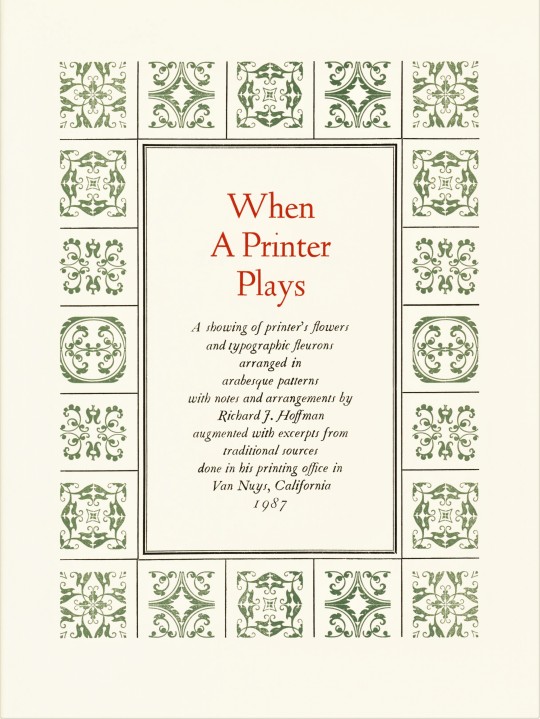
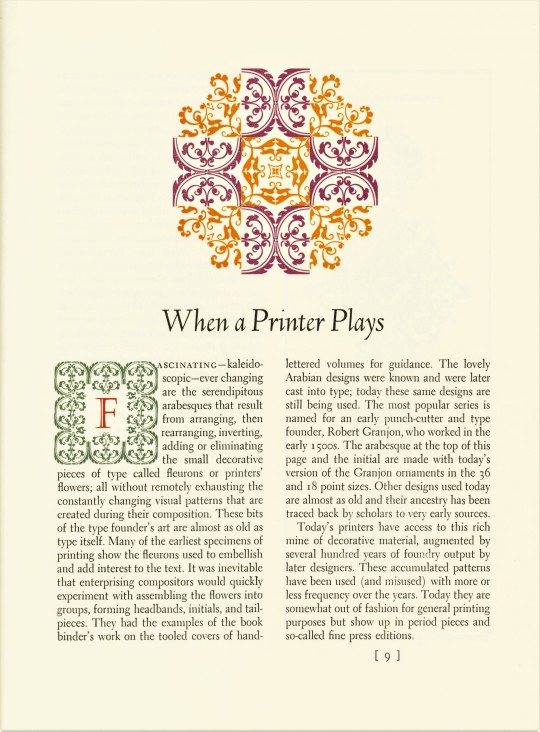
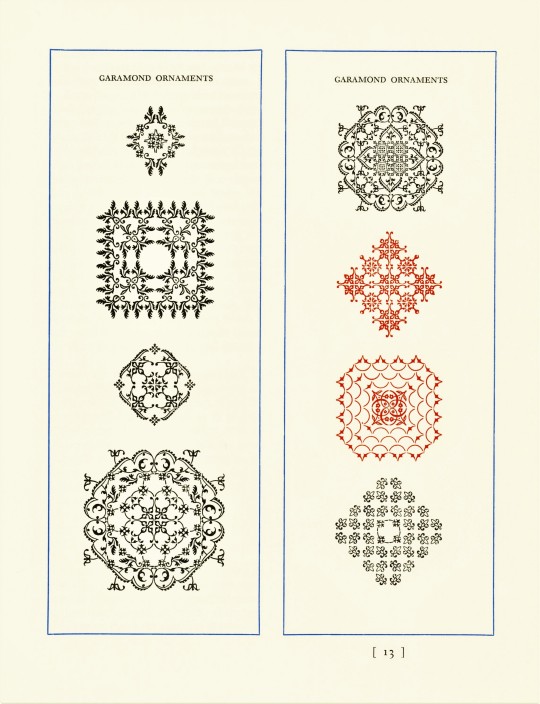







Typography Tuesday
Richard J. Hoffman (1912-1989) was a long-standing letterpress printer and collector of type in the Los Angeles area from 1925 until his death in 1989. One of his final projects was this publication, When a Printer Plays, printed in 1987 at his shop in Van Nuys, California in an edition of 200 copies. The book is an historical presentation of fleurons and printers' ornaments with over 200 designs of his own invention made from individual pieces of foundry and monotype units that he collected over more than 50 years. California rare book dealer John Howell called When a Printer Plays Hoffman's magnum opus, noting that "Hoffman lavished the utmost care upon every detail of typesetting, arrangement, margins, proportions, multi-colored patterns, and illustrations."
Hoffman begins with Garamond and Granjon ornaments first designed in the 16th century and moves toward more contemporary ornaments by designers such as Bruce Rogers, Will Bradley, Thomas Maitland Cleland, David Bethel (Glint Ornaments), and Rudolph Ruzicka (Fairfield Ornaments). All the letterpress printers we know delight in creating borders and designs from typographic ornaments, and Hoffman quotes Bruce Rogers:
When my own time comes to be marooned on a desert island . . . instead of taking along the favorite volumes that most amateur castaways vote for, I think I shall arrange to be shipwrecked in company with a Monotype caster and a select assortment of ornamental matrices. The fascination and amusement . . . that can be got out of the almost numberless combinations of a few simple units would enable me to cast away for an indefinite period with great contentment.
Linotype Electra was used for the text in this book, with Deepdene for display. Our copy of When a Printer Plays is yet another donation from the estate of Dennis Bayuzick.
View more posts of type ornaments.
View other books from the collection of Dennis Bayuzick.
View more Typography Tuesday posts.

#Typography Tuesday#typetuesday#decorative type#type ornaments#Richard J. Hoffman#When a Printer Play#type display books#type specimens#type specimen books#ornamental type#fleurons#Bruce Rogers#Linotype Electra#Deepdene type#Dennis Bayuzick
167 notes
·
View notes
Text
The Fantasy Language Translation Matrix
Whether you intend to write your own full-blown lexicon with different verb tenses and formal vs informal language, need unique words for spellwork, or just need new names for all your foreign places, behold… the Physalian patented Fantasy Language Translation Matrix.
(I kid. I have no idea if I’m the first to come up with this)
**Disclaimer!** After rolling out your fresh new vocab off the word assembly line, make sure you google it and that it doesn’t already exist and mean something you don’t intend.
Step 1: Pick your Derivative
You can make it sound completely foreign and like total gibberish, but I find it easier for you and other people to read if they have some real-world reference to compare it to, and so they have a clue for which pronunciation rules to rely on. For example: I did not know who René Descartes was my freshman year of high school. His last name was in my algebra book, and I, thinking he was Greek like so many other ancient mathematicians, pronounced his name as if he were Greek “Des-kart-ees.” I got made fun of.
Spare your readers the humiliation.
So say I want a vaguely… Russian/Latin/Italian influence. As opposed to French. Cool. That’s my starting point.
Step 2: Reorder the most common letters from English to your new language
In English, the average use of the standard alphabet by letter in order is this:

Ignore your vowels for a second. I don’t use charts like this on the regular, I use the Wheel of Fortune method and focus on RSTLNE, then go from there. I also want to make sure this isn’t a complete 1:1 ratio so it’s not super obvious I’m just juggling letters around, so I’ll knock out some “duplicate” letters and swap out singular letters for specific sounds.
The goal of this isn’t to stare at two existing language matrices and perfectly match them up, it’s to take the most common sounds and letters in English and make them new, common sounds in your new language, to sound more uniform and like you have a real etymology.
And I end up with this:

This might look a little confusing on how I got from A to Z so the basics:
All my vowels remain in the same place, they just get juggled around so I don’t end up with 8 consonants next to each other and word garbage
My “duplicate” letters are combined so I have more room for the new sounds, like c/k, f/ph/gh, h/wh, s/z. The new sounds then get the spare letters I had left over
Common english suffixes get reduced down so the pattern isn’t as obvious
If you want to include accent marks, this is your chance
I wanted to really emphasize the long “e” and long “i” sounds, so those got extra attention
Step 3: Translating
Oftentimes this is not perfect, or you end up with a word that just doesn’t fit the rest of your new vocabulary, because English is the bastard lovechild of German, Latin, Danish, and French.
I start with English, usually, but if the English word is too short or too long, I translate it first into another language, like Spanish, and go from there. Like “bus” vs “autobus”.
Using your matrix, go one by one. Let’s use a word like “letter”.
English: L-E-T-T-E-R
New: T-A-C-C-A-Z
Step 4: Polishing
So now I have my new word: “Taccaz”
Which is serviceable. I can throw an accent on either A or fiddle with the Z. I can start with “carta” instead and end up with “kizci”. The matrix is just a starting point. It’s designed to streamline the process when I’m otherwise feeling uncreative and in a rush, and it moves very quickly when I need to come up with full phrases and sentences that someone would actually say.
Step 5: Full sentences
This is only if you’re really digging deep and not coming up with the occasional fantasy curse word or new name for your fantasy land/realm/noun etc.
For this you’re going to need lots of tables. I based mine off romance languages because I know Spanish and romance languages make sense. This is where you decide how many pronouns, if any, you’re going to use, how the infinitive changes based on past, present, or future tense, how many nouns the word references, etc.
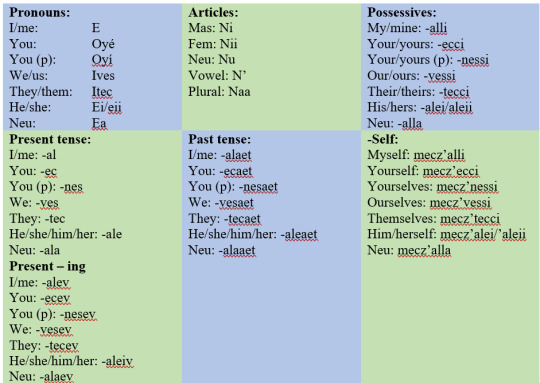
This is… a lot. Way more than you’d ever need for your manuscript. Ever. But I did it just for my own sake. Does it get long? Yes. Does it get tedious? Yes. The point here is to have little pre-manufactured word bytes you can plug and play with, with as little mental effort as possible so you can save it for the rest of your work.
I also came up with very common words already conjugated, like “to be” so I can just glance and type without having to remember to take “is” and go through the process over and over again.
Which means that I can take an entire sentence and translate it to my new language in about two minutes.
English: The payoff is worth it, this is so satisfying.
New, roughly: Nu kioyb ela fyzip ne, iski ela valo nicenbalaev.
Of course, you can keep tinkering until you get something that’s easier on the eyes (I’ve been working with this language for years so I can read it pretty well), but not all languages are smooth and pretty and simple.
To be frank: Most readers will just gloss over this stuff anyway, but it shows that you put in the effort and it enhances the lore and the immersion when you do this. At least in the written medium. You can’t ignore it if this is meant to be in a screenplay.
Is this what a language professor would do or recommend? Probably not, I have no idea. Does it work? Yes. I have a fully functioning grammatical system where any input can give me a legible output.
To make this yourself, just change the order of the letters around, adjust your shortcuts, and come up with your own common sounds for those last two rows. The conjugation matrix is where you can really make it distinct, assuming you are basing yours off a romance language, which you don't have to.
—
And there you have it!
Don’t forget to vote in the dialogue poll before it closes!
#writing resources#writing advice#writing tips#writing tools#writing a book#writing#writeblr#fantasy#sci fi#fictional language#language#world building
41 notes
·
View notes
Text
#MonochromeMonday + #OwlishMonday:

Lukta Qiatsuk (Inuit, 1928-2004)
Owl, 1959
Stonecut on paper
photographed at Brooklyn Museum
“[This work] belongs to the first official catalogued collection released by Kinngait's West Baffin Eskimo Co-operative in 1959, shortly after the introduction of printmaking to the Canadian Arctic two years prior. Many early Kinngait graphic artists adapted their skills as stone carvers to engrave stone matrices used for printmaking. Their work often illustrates the natural world, such as…Lukta Qiatsuk's playful image of an owl taking flight.”
#animals in art#20th century art#museum visit#bird#birds in art#birds#owl#Snowy Owl#print#stonecut#illustration#First Nations art#Indigenous art#Canadian art#Brooklyn Museum#exhibition#Owlish Monday#Monochrome Monday#Lukta Qiatsuk#modern art#1950s
31 notes
·
View notes
Text
The main thing I have against Spotlight: Hot Rod is that it portrays him as being constantly weighed down by past losses and guilt, to the extent that he even limits himself for fear of facing the potential negative consequences that his misjudgement might inflict onto others - the "prefer to go solo" line - when it contradicts the very essence of his character as established in MTMTE and the main comics (even Autocracy), which specifically presents him as the type of person who is unburdened by the past and for the most part consciously remains unaffected by the consequences of his actions. It's why he has a perpetual Peter Pan thing going on, because he moves on from one day to the next, one crisis to the next, for four million years without letting the experiences change him - which includes the experiences of deaths and sufferings of both himself and others - and maturity and growth cannot be achieved without change.
His impulsiveness and headstrong obstinacy is in part a compensation mechanism for insecurity and subconscious self-doubt but is also an intrinstic aspect of who he is, someone who plows onward while refusing to look back. He can feel sorry but he does not do regret, much less mire himself in it like his spotlight appears to suggest. As a matter of fact he doesn't mire himself in anything at all - be it politics, responsibility, or guilt. He doesn't regret Nyon, nor Ironhide, nor Optimus' resignation, nor leaving Cybertron, nor trusting Megatron. Not even the Overlord incident, since although he does feel bad for his poor decision getting a bunch of people killed, in the end the biggest issue that he has with it is the 89/101 voting result (which isn't even solely about Overlord).

It's obvious that he wants - expects - to stay as captain in spite of everything and having the vote cut so close got him hard because it's a blow to his ego. He practically admits to this when Optimus calles him out, which again is in direct contradiction to his spotlight monologue.
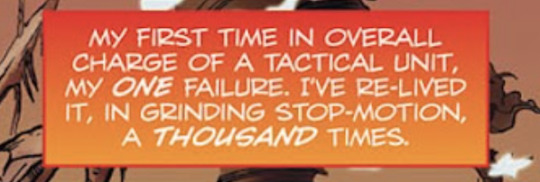
If he's willing to apply this kind of introspection for a failed mission that can’t even be attributed to his fault, then a lot of his later screwups would never have happened.
Choosing to return the Matrix to Optimus is supposed to be a landmark incident of Rodimus' character growth, yet he regresses right back in MTMTE, in which he develops a recursive pattern of messing up, trying to do better by making amends, then returning to his old ways because he can't fully commit. There's no fundamental change going on. I would argue that the true pivotal moment of change to his character took place during his talk with the guiding hand in Mederi, when he first learns to look past himself to accept what's best for other people, how his decisions might affect them etc. - even if it clashes with his own desires.

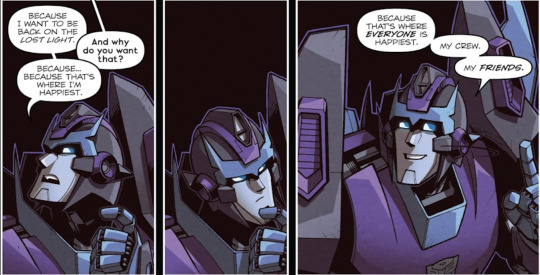
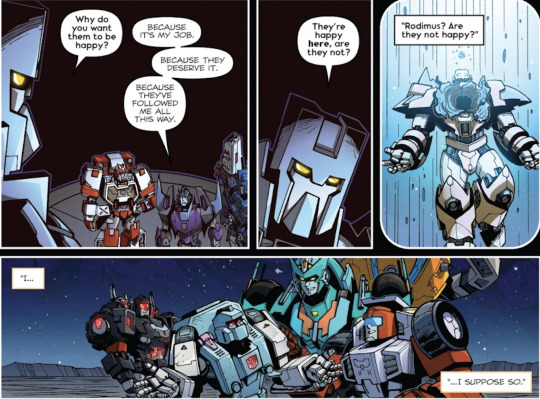
And then he chooses to save Getaway, and the speech that gave everyone the confidence to open their matrices. There's change and growth and maturity, he learns to fully empathize and appreciate the people around him. But with this growth comes a double-edged sword: by opening himself to connect with other people he leaves himself open to be affected as well - he is irrevocably changed by his experiences aboard the Lost Light, by the people around him he's grown to care about, so that when the Lost Light lands for its inevitable end and everyone departs to pursue their own lives, he alone remains mired in place, with nothing but the past to cling to. After a lifetime of moving on and brushing horrors off without lasting issue he's suddenly unable to move on. The remainder of his life becomes defined by the weight of memories and loss (and the empty comfort of a parallel universe of which its existence he'll never know).
#the Lost Light is his Neverland lol#I was thinking of that quote#blah blah life never gives anything for nothing and a price is always exacted for what fate bestows#anyways this started as a one-star review for spotlight hot rod and then got off topic. again. for the umpteenth time#I'm aware that inconsistent characterization is a common thing for this kind of long comics with multiple writers#but for the most part I find Rodimus' character to be fairly compatible throughout the different series#transformers#idw transformers#maccadam#mtmte#rodimus#hot rod
51 notes
·
View notes
Text
"This war bores everyone, doesn't it?
I'm not bored, because I'm convinced that if we're bored with war today, we'll will have it at home in a few years' time. There are many signs of this, even President Biden says so - if Ukraine falls, the NATO countries will be next. Poland, on the other hand, is not a country on the eastern flank, as is sometimes said, Poland is a NATO front country. Therefore, I am convinced that we should support Ukraine's armed forces in our own interests too. I will continue to do so in the future as best I can.
As some of you may know, at the beginning of this year I organized a fundraiser to which you contributed more than 150 000 EUR zlotys: With this I bought 4x4 vehicles that I prepared for the conditions on the front, bought drones, including a Matrice with a thermal imaging camera for more than 20 000 EUR, bought rifle accessories, night vision devices, scopes, generators and many other things which, thanks to the indispensable Monika Andruszewska, I personally brought to the front, to the trenches and into the hands of the soldiers fighting against Russia.
I was at the front three times in Ukraine. I wrote two essays about this experience, which were published in Polish in Gazeta Wyborcza, in German in Neue Zuercher Zeitung and (one of them) in English in The Point. Links in the comments.
So everyone is bored with this war. But I think of my buddies I've met in this war and they can't be bored with the war. So I recently asked one of them, Dima from the Marine infantry, who is in the south right now, on the banks of the Dnieper, what they need.
"What do we need? Man, FPV drones and REBs. That's the most important thing right now," replied Dima.
"Look. A mortar shell costs about one thousand euros. An FPV drone costs between five hundred and one thousand euros. To hit something with a mortar, we have to fucking fire ten grenades. And an FPV drone only needs one. Do you understand what the difference is?
FPV drones are weapons that are as improvised as they are deadly. They are created mostly from Chinese components and assembled by volunteers, specialized companies or units themselves. Their sole purpose is destruction - the entire design is subordinate to this purpose. On the back of the drone are the battery and antennas of the video transmitter (which usually uses an analog rather than digital signal that is more resistant to jamming), underneath are the quadrocopter's propellers and motors, and on the belly is the payload - a bazooka warhead, a mortar shell or something else. All of this is held in place by zipties.
The pilot usually works with a navigator and a second team flying an observation drone to get a wider view. The drones have a range of about fifteen kilometers, depending on the size of the payload. Their advantage over commercial drones, which cost at least three thousands eruos and from which small shells are dropped, is the weight of the explosive charge or the effectiveness and, above all, the price. The ZSU loses thousands of drones every month - an FPV drone is six times cheaper and much more effective than a Mavik or Matrice with a grenade. Their mere presence on the front line changes the whole situation:
"With an FPV drone I can easily fuck up their tank, a IFV, cars and pick-ups, even while they are on the move, which is rather impossible with a mortar", Dima told me. "For this reason, Russians has to keep its machines at a distance, with tanks they shoot from afar, but they are afraid to drive up, because everything we notice can be destroyed. They keep everything at least ten kilometers away from the null. The topic of FPV has been around for a year or a year and a half, but now we have the problem that Rustia has more of it than we do. So you can understand it yourself. The whole machinery of the empire is working with them for this, the Chinese are helping them, you know?
Every war has its swords, it also has its shields.
Shields against drones are jammers. The Ukrainian soldiers, like the Russians, call them REBs - РЕБ, stands for "Радіоелектронна боротьба", radio-electronic warfare.
"There are many types of REBs. The Russkies have great radio-electronic warfare systems, and in this field they have an advantage over not only us, but over everybody else," Dima continued to explain to me in a signaled voice. "Their jammers are such big machines, with a big antenna that are easy to identify, and we have destroyed many of them for them. That's why they use such smaller ones now, they call them "trenchers', and they drown out everything, right? All communication channels. And the antenna is barely visible. Well, and now we need some that can be mounted on cars, and for us, in the naval infantry, also on the boats that we sail across the Dnieper. We, the pilots, are on the right bank and our infantry on the left. For them, the entire supply goes by boat, and you can't hide on the water. Without an REB, as you understand, such a boat is doomed."
But REBs can't be just any kind. In one airborne brigade I know, the guys were sitting in positions a few hundred meters from the borders of Bakhmut, of which they were among the last defenders. The whole platoon share the cost with their own, private money and bought the cheapest REB, because the Russians were attacking them from the ruins of the burnt city with whole waves of FPV. For three days after the purchase, they rejoiced at the sight of Russian drones dropping far in front of their positions, drowned out by the REBs, without harming the boys. On the fourth day, the Russkies changed their frequency and a drone flew directly into their trench.
This terrible war will end successfully if we get bored, not with us, but with the Russians. That's why I want to help my Ukrainian friends to make it a bit more unpleasant for the Russians.
That's why I'm appealing to your generosity once again: donate, please. I will use everything I can raise to buy FPV drones and REBs from trustworthy and military-proven suppliers. Then I'll put everything in a car and, together with Monika Andrushevskaya, personally take it straight to the trenches, to the units we've already helped, namely
- 72nd Mechanized Brigade, where I spent most of my time,
- the 77th Airborne Brigade, where a company is commanded by my colleague Dzhura, whom you've already met if you check my social media from time to time
- to the naval infantry in Kherson,
- to the special forces, to Omega and other SSOs of the ZSU."
Szczepan Twardoch
21 notes
·
View notes
Text
Watching Fantasy High Junior Year has made me curious of something.
I've been out of high school for a year, did my first year of university last year, and I need to know; are the summer scaries an actual thing.
Like do y'all actually experience dread the days before school starts.
Granted I had a pretty fun time in highschool, I didn't have any issues with anyone and was relatively popular for a high school with a matric class of 24 people.
Are they a common thing, is it an American thing, or am I just weird?
#dimension 20#d20#lexi's diary#d20 fantasy high#fantasy high junior year#fantasy high#dimension 20 fantasy high#dimension 20 fhjy#d20 fhjy#fhjy
31 notes
·
View notes
Text

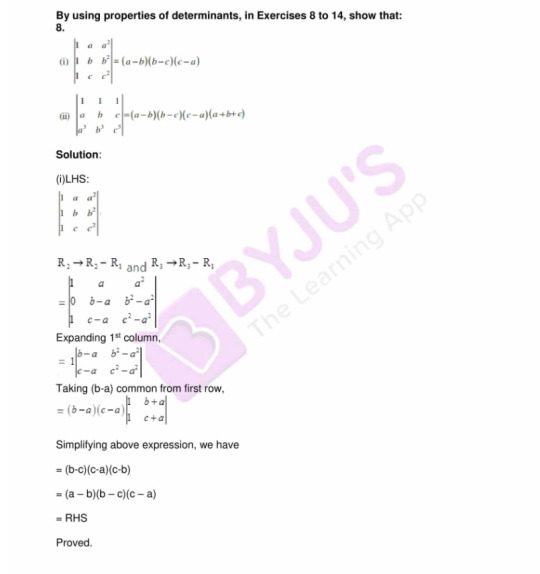
19.01.2024, Friday
They called us to school once again to 'practice' for physics and bio practicals which are in the first week of Feb, I don't think much 'practicing' happened but we did get some core points to focus on while preparing. I'm a little apprehensive about physics because it's been months since I've done any of the experiments but I've always been good at practicals so I think I'll manage. I want to finish my math and physics revision before practicals week because I barely have any time after that. I'm leaving chem for last because I will definitely want to procrastinate chem and I can't afford that right now so I'll do it last with the pressure of the deadline on me so that I refrain from procrastinating. I've been getting more and more nervous about the theory exams as the days progress and I don't want to think about them right now. I'm practicing each chapter individually and then doing previous years papers and sample papers during the revision time I don't know if that'll be enough but I hope it is. Didn't get to study much today but I did finish the second half of this chapter, I love matrices and determinants they're the easiest thing in the whole book.
Time Studied: 3 hours
Subject: Mathematics
Content: Determinants
#niajournals#student life#self help#self improvement#studyblr#studyspo#chaotic academic aesthetic#study motivation#studying#dark academia#light academia#academics#academia#academia aesthetic#academic validation#academic weapon#dark academic aesthetic#stem academia#chaotic academia#exam study#study blog#med studyblr#study#study aesthetic#study hard#study inspiration#study inspo#study mood#study notes#study space
25 notes
·
View notes
Text
Changes to the Tax Collection System in Revolutionary and Napoleonic France
My translation from Le prix de la gloire: Napoléon et l’argent by Pierre Branda.
This part is specifically about the reforms made to the tax collection system. Problems with taxation had been the source of many woes, so it went through major changes.
“The [tax] work of the Consulate mainly concerned the reorganization of tax collection. Until now, this essential element was not administered directly by the Ministry of Finance. The Constituent Assembly had wanted the tax rolls for direct contributions, that is to say the ‘tax slips’, to be established by municipal administrations. Their work was complex, because each year it was necessary to draw up a list of taxpayers, determine each person’s share of tax and send them the amount of the contribution to pay. Poorly motivated (or even corrupt), the municipalities had put little care in the execution of their mission since a large part of the taxpayers had not yet received anything for their taxes of year VIII, or even of year VII or year VI. Also, with two or three years of delay in preparing the rolls, it was not surprising that tax revenues were low (nearly 400 million francs were thus left outstanding). If the sending of tax matrices left something to be desired, the collection of direct contributions was hardly better. The tax collector was also not an agent of the administration: this function was assigned to any person who agreed to collect taxes with the lowest possible commission (otherwise called ‘collecte à la moins-dite’). With such a system, there were numerous inadequacies, often due to incompetence, but also due to the prevailing spirit of fraud. However, in their defense, the profits of the collectors were most of the time too low to provide such a service; also, to compensate for their losses, they were ‘forced’ to multiply small and big cheats. In any case, in such a troubled period, letting simple individuals carry out such a delicate mission could only be dangerous for the regularity of public accounts. In short, the mode of operation of taxation that Bonaparte and Gaudin inherited was failing on all sides and threatened to sink the State.”
“One month after Gaudin’s appointment, on December 13, 1799, the Directorate of Direct Contributions was created with the mission of establishing and sending tax matrices. This administration, dependent on the Ministry of Finance, was made up of a general director, 99 departmental directors and 840 inspectors and controllers. The organization of direct contributions became both centralized and pyramidal, the opposite of the previous system, decentralized and with a confused hierarchy. The work of preparing the rolls, for so long entrusted to local authorities, passed entirely ‘in the hands of the Minister of Finance’ and in this way the taxpayer found himself in direct contact with the administration. The tax system no longer having any obstacles, the beneficial effects of such a measure did not take long to be felt. With ardor, the agents of this new administration carried out considerable work: three series of rolls, that is to say more than one hundred thousand tax slips, were established in a single year. It must be said that the ministry had not skimped on their pay (6,000 francs per year for a director, 4,000 for an inspector and 1,800 for a controller), which was undoubtedly not unrelated to such success.”
“Tax reform was slower. It was not until 1804 that all tax collectors were civil servants. The consular system gradually replaced the collectors of the departments, then of the main cities and finally of all the municipalities whose tax rolls exceeded 15,000 francs. At the end of the Consulate, the entire tax administration was thus entirely dependent on the central government. Subsequently, the one in charge of indirect contributions (taxes on tobacco, alcohol or salt) created on February 25, 1804 and called the Régie des droits réunis was built on the same pyramidal and centralized model. It was the same later for customs.”
“According to Michel Bruguière, historian of public finances, ‘Napoleon and Gaudin can be considered the builders of the French tax administration. [...] They had also developed and codified the essential principles of our tax law, so profoundly derogatory from the rules of French law, since the taxpayer has nothing to do with it, while the administration has all the powers’. Basically, after having clearly understood the true cause of the ‘financial wound’, Bonaparte wanted an effective, almost ‘despotic’ instrument to avoid experiencing the unfortunate fate of his predecessors. As a good soldier, he created a fiscal ‘army’ responsible for providing the regime with the sinews of war. It was also necessary to definitively break the link between private interests and state service in everything that concerned public revenue. The time of the farmer generals of the Ancien Régime or the ‘second-hand’ collectors of the Directory was well and truly over. Napoleon Bonaparte, with his fierce desire to centralize power in this area as in many others, undoubtedly gave his regime the means to last.”
French:
Page 208
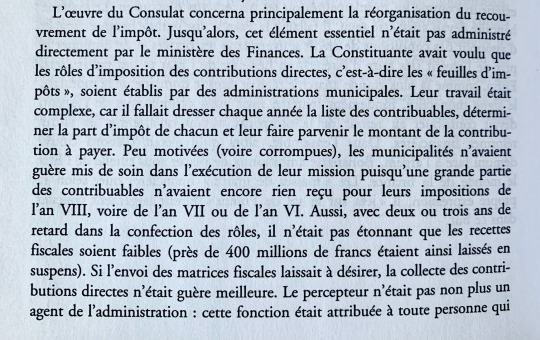
Page 209
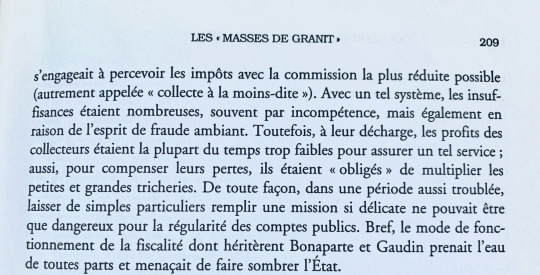
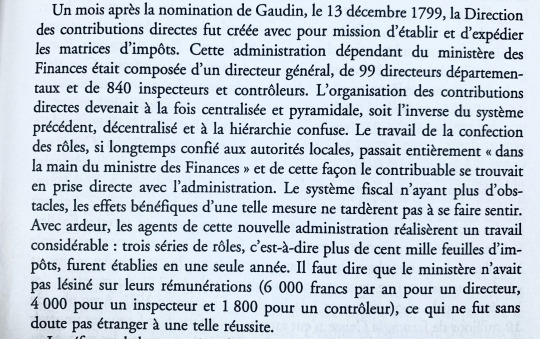
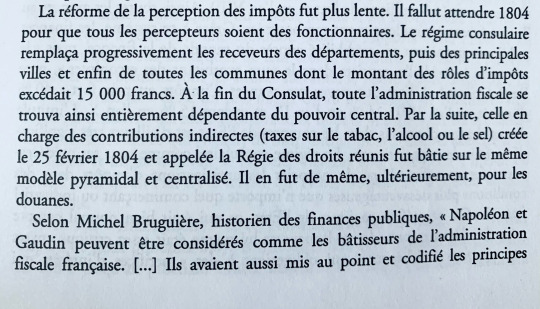
Page 210
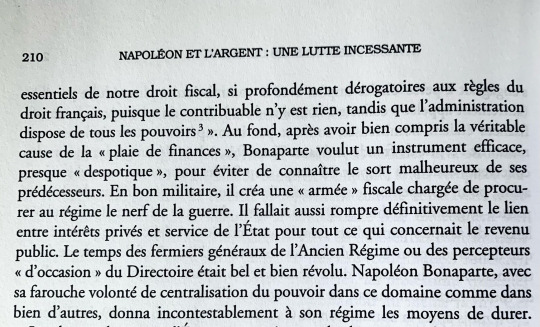
#Le prix de la gloire: Napoléon et l’argent#Le prix de la gloire#Napoléon et l’argent#napoleon#napoleonic era#napoleonic#napoleon bonaparte#19th century#first french empire#1800s#french empire#france#history#reforms#finance#economics#french revolution#frev#la révolution française#révolution française#Gaudin#tax#tax collection system#taxation#law#napoleonic code#source#french history#branda#Pierre branda
36 notes
·
View notes